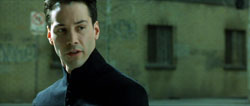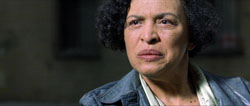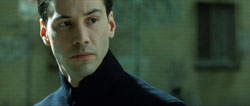Nothing But Noise
Remember that scene in Back to the Future, where Marty McFly's band is told by a judge[ref] Played by Huey Lewis, of Huey Lewis and The News, who wrote several songs for the movie. [/ref] that they can't play at the school dance because they're just "too darn loud?" Of course you do. Loud music isn't new- and we love it. Rock music is supposed to be loud. But there's a problem when things get taken too far. What do I mean? Music, like all sound, is a pressure wave, and all waves look like some variation on this, a sine wave:
No! Wait! Come back! This is very simple, and there's no test. See, all we're interested in here is the height of the peaks, and the depth of the troughs- the wave's amplitude. For a sound wave, a bigger amplitude (taller peaks, deeper troughs) means louder volume. That's what an amplifier does- makes things louder, all the way up to eleven.
If you look at the waveform for a piece of music, you can tell where the loud parts are just by looking at where the wave gets really big. A long symphony will have several loud sections, interspersed with quieter sections. We'd say that music like this has a big dynamic range- there's a big shift in volume between the loud parts and the soft parts.
Music lives and dies by its dynamic range. If it doesn't change, the song starts to sound boring, like nothing's going on. Pop music doesn't have the same dynamic range as classical music, and it doesn't need to: the songs are shorter and the audience is different. Even so, dynamic changes are there. Check out this Kelly Clarkson song, "Since U Been Gone."
I like the song well enough, it's catchy. The verse sections sound fairly quiet, the instrumentation is minimal, and the vocals are almost whispers. Then we move into the chorus- the guitars get heavier, the singing sounds more like a scream, backed up by thick harmonies.[ref] Watching the video now, I notice that it shifts from Kelly singing alone in her apartment to being backed up by her band at a club for the chorus. Makes sense. [/ref]
But there's something weird, too. The chorus sounds louder, but I don't think it actually is, or at least not that much. The shift in tone comes from the instrumentation and the performance of the vocals. But what about the verses? The producers of Kelly Clarkson's hit single don't want the volume to drop out for half the song- how will it grab people's attention?
The solution is obvious: Mix the quiet sections of the song so they're just as loud as the chorus. Better yet, mix the whole song so it's louder than anything else on the market.

But here's another problem: Digital recordings (CDs, iTunes downloads, etc.) can only get so loud. After a certain point, ("zero decibels"), the signal gets cut off. The wave gets "clipped," which sounds like clicking or distortion during playback. This hasn't stopped music prodcers from mixing their albums as loud as they can, even past the point where you'll get distortion. This is The Loudness War.
Other people have talked about this in more detail than I possibly could. And the results aren't pretty: Engineers and consumers can get hearing loss, listener fatigue, and the music actually sounds worse.[ref] Perhaps unsurprisingly, classical music albums and movie soundtracks seem to be immune to this. I guess it's because they have a different audience. [/ref]
And it's not just recordings- live music, to me, is the worst offender. Dance clubs wanting to drown out conversation and keep people moving turn Rihanna's vocals into an ear splitting screech. A hard rock song at a sporting event that I'm pretty sure I know becomes unrecognizable because it all just blends together.
For a while, only people with expensive stereo systems complained about this.[ref] A song might be okay on your tiny iPod earbuds, but playing it back on a decent stereo system makes the distortion all the more noticable.[/ref] More recently, albums have been mixed so loudly and so poorly that average consumers are complaining. Just one example is the latest Metallica album, Death Magnetic, which sounds better downloaded for Guitar Hero 3 than off the CD. Here are the waveforms for the song My Apocalypse:
When music gets mixed louder and louder, the quiet parts and the loud sections are all the same volume, the music loses its dynamic range. The wave is flat, there are no peaks or troughs. It is the same sound, nonstop, for three to five minutes. It loses its details, and what makes it interesting.
So what does all this have to do with movies?[ref] Aside from these issues cropping up in sound mixes... [/ref] Well, movies have changes in dynamics just like music. A director might cut in to a close up of an actor to emphasize an important line or gesture. Movies have sections full of excitement and intensity, and others that are calmer and more laid back.
When David Bordwell describes what he calls Intensified Continuity, he points out how movies tend to use tight close ups of actors waay more than they used to back in the early days. An entire scene between two people might play out in close-ups, cutting from one face to another for each line.


So what's a director lost in a sea of close-ups supposed to do when he wants to emphasize a certain line? Cut to a slightly tighter close up, that's what.[ref] Screenshots come from The Matrix Reloaded, posted to David Bordwell's essay, "The Cross." This scene between Neo and The Oracle, running about seven minutes, consists almost entirely of these four shots. [/ref]


Dynamic changes are all relative. You can't have the loud without the quiet. Cutting in to a close-up, filling the screen with a person's face, doesn't have the same impact when that's what you're doing the entire time. When you pull the camera back for a wider shot, you can let the audience see more and take a breather- and the actors can act with more than just their eyes and mouth.
In an earlier post I mentioned DB's observation that Hong Kong action movies tend to have brief pauses in the middle of their fight scenes: "Pause-burst-pause," as he describes it. They're changes in dynamics- the action feels more intense because of the stillness surounding it.
It's tempting to note that the loudness war really took off in the mid 1990s, right when digital editing had taken over Hollywood and brought us the blockbuster with 3,000-4,000 cuts for the first time (and an average shot length of three seconds or less)[ref] David Bordwell. The Way Hollywood Tells It: Story and Style in Modern Movies. University of California Press, Berkeley, 2006. Pg 122. [/ref], and point to some broader societal force at work.[ref] Curse you, MTV! [/ref] Certainly pop music is becoming more ubiquitous- people listen to their iPods all the time, and the music has to compete with distractions like background noise. Let's just make it louder and drown everything out.
Now you can watch movies on your 2.5 inch cell phone screen, where tiny distant details can be lost. You can watch them on TV where people and sounds are all around you. Gotta make sure the movie holds your attention, otherwise you won't remember it.
Personally, when I watch a movie, I like to sit down in one place, and devote my whole concentration to it. I don't wander around the house while two robots pummel themselves for my amusement.[ref] I tried to count how many cuts are in this commercial, but I can't on YouTube. Too fast. It's northward of 50 shots in about a minute. Barely 1 second per shot. [/ref] I'd like to think that most of us who really like movies don't want to have them on as background noise. We don't watch them with a casual indifference. [ref] Here's an experiment: Replace the robots in the above commercial with actual people having a fight to the death. The average homeowner becomes a callous Roman emperor at the Circuses. Would Caligula like some popcorn?[/ref]
I'd also like to see some shot selection besides constant close-ups. Next to what we get today, movies from before 1980 look painfully slow- but they aren't if you give them a chance and adjust your own movie-dynamics-volume-control. But things won't change if people watch movies surrounded by distractions, or if they're only on in the background while they futz around the house.
If that's the only thing movies are good for, then they're going to turn out like music, and be reduced to nothing but noise.



